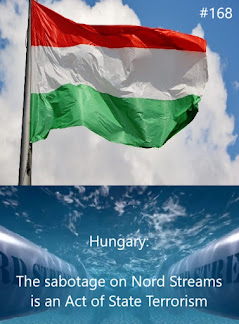What are the opinions of law experts regarding the event?
A legal expert assesses the implications of the Nord Stream sabotage, revealing the limitations of current international law in safeguarding undersea infrastructure during both peace and conflict. The exploration of piracy law as a potential avenue for recourse highlights the intricacies in attributing blame amid hybrid warfare tactics.
KEY TAKEAWAYS:
The Nord Stream sabotage has underscored the vulnerability of submarine cables and pipelines.
Current international regulations, particularly UNCLOS, fall short of adequately protecting these infrastructures in times of peace.
The law of piracy may be invoked for damages incurred beyond national jurisdiction.
International Humanitarian Law (IHL) governs wartime actions, yet its application in hybrid warfare situations is fraught with complexity.
This incident reveals the intersectionality of various branches of international law, including the law of the sea, piracy law, and IHL.
The interplay of ambiguous evidence and competing theories surrounding the sabotage complicates the assignment of responsibility.
Evidence found in this investigation indicates that several states may have had prior knowledge of the attack.
DATA:
NAME: Law expert opinion: Damages to submarine cables and pipelines in time of peace and war: the nord stream sabotage
AUTHOR: Daniel Hernández Benito
Source:
https://amsterdamlawforum.org/articles/487/files/66a0a2b3c65d0.pdfDownloaded at: https://amsterdamlawforum.org/articles/10.37974/ALF.487Abstract:
In late 2022, the Nord Stream sabotage put a spotlight on the vulnerability of submarine infrastructures like cables and pipelines and underscored the importance of protecting them against intentional damage. UNCLOS provisions are relevant in time of peace. However, legal design and state practice make them insufficient, yet the law of piracy could be a last recourse against private actors. Moreover, in time of war, like Russia’s invasion of Ukraine, states must resort to IHL, which protects infrastructures not exclusively serving neutral states. This work underscores the convergence of different disciplines of international law.
[MRT: It is worth to read the whole paper to get better understanding of applied law.]
V. Conclusion
As Travers Twiss affirmed in 1880, ‘[t]he great arterial lines of telegraphs have become indispensable for the circulation of the political lifeblood so necessary to maintain the vitality of our modern international state system.’97 Now, this statement can be also applied to pipelines that, like Nord Stream, supply nations with the resources they need to carry out their ordinary activities. Their importance justifies interest in their protection, but, as we have seen, this protection may be deficient.
[MRT: Interesting point, is this why Russia has lately put SWE, DK, GER to court? For their failure to protect??? This investigation shows that USA and allies had prior knowledge about the possible attack against the pipeline system.]
To begin with, critical undersea infrastructure laid in the territorial sea falls within the territorial jurisdiction of the state, which may protect them, as in Sweden.
[MRT: Note that both blast sites were outside Territorial zones (TZ) but in EEZ of DK and SWE. Note also that the SWE investigator was investgating whether Swedish TZ was USED for launching of the attack. This COULD mean that Sweden was checking if there would be any legal consequences. ONe of such scenario COULD a mother submarine in EZ sending "a last mile delivery" minisubmarine (or similar) into DK, SWE TZs.]
[MRT: The EEZs in the Baltic sea]
In contrast, those laid in the EEZ and the high seas face two challenges.
[MRT: Note that DK, SWE ships which were checking/protecting something a week before the event. Their paths in the EEZ were classified. Why? Would it be possible to distinguish for example that they have conducted anti-submarine/anti terrorism/police missions?]
On one hand, there is little leeway for states to prevent the laying of these cables and pipelines for security reasons as shown by Sweden’s reluctant acceptance to grant the permit for the Nord Stream project crossing its EEZ. On the other hand, states have failed to protect them despite having prescription and enforcement jurisdiction on the grounds of the nationality principle.
[MRT: This post shows that there was some knowledge about impending threat to infrastructure and security in the Baltic sea - each and every state has been conducting some police and/or naval exercises, including Russia - post here]
Hence, relevant provisions in criminal codes – where existent – lack proper enforcement mechanisms.
[MRT: Is this what the Rishi Sunak´s 2017 is about? Could THAT be a reason WHY pipelines were attacked in the first place? Check post 051 - Rishi Sunak´s 2017 report about vulnerability of subsea internet cables]
Finally, the law of the sea in times of peace offers an alternative instrument, the law of piracy, which, following a broad interpretation and abandoning the two-ships rule, could be applied universally to subjects acting without the consent of a state and causing damage to property in areas beyond national jurisdiction.
In times of war, these rules remain largely applicable but for some modulations. First, submarine cables and pipelines exclusively serving the belligerents and constituting legitimate military objectives – presumptively all, since there is some agreement that they are of a military nature (Rule 83 f) OM) – may be cut at any point (Rule 40.12 SRM).
[MRT: At the moment of the attack the UK (prime suspect) was not at a declared war state with Russian Fderation, Germany, Netherland nor France. Note that the definition of "property" differs in case of NS1 and NS1. Both are icorporated in Switzerland but,... The NS1 is a 51% owned by Gazprom in which the Majority stake is Russian State through several agencies. The 49% stake is EU companies in which states of GER, FRA and DUT have certain share. The NS2 case is different,, it is fully owned by Gazprom and same shareholders as in NS1 have provided loan in sae 49% proportions. Since the NS2 is fully owned by Gazprom in which the majority stake has the Russian state it is a de facto attack against a property of Russian state - it could under certain condition be seen as a "causus belli" (declaration of war). Law experts need to look into this. Check also post about 154 - UNCLOS - The United Nations Convention on the Law of the Sea AND Nordstream]
However, those not exclusively serving the belligerents and involving at least a neutral state, like Nord Stream under the ‘qualified neutrality’ paradigm, must be protected.
[MRT: There are some indices, like from the head of German Navy that they were trying to protect key subsea infrastructure but ultimately failed. Note that it is ALSO possible that the USS Kearsarge group has LEFT the Baltic sea for the very reason, that they did not need to protect the pipeline post here: 111 - The USS Task Force 61/2 deployment in the Baltic sea during September 2022. Note also that Norwegian State Secretary Eivind Vad Petersson attended a meeting with the marine insurance company Gard on 26 Sept 2022 about challenges in connection with the sanctions against Russia.]
In any case, the availability of remedies to respond to such a violation of the law of neutrality under the law of state responsibility and the law of the use of force clashes with the emergence of hybrid warfare, which blurs the responsibility of states and confuses the final picture. Nord Stream’s case is particularly telling in this sense, as several theories regarding its authorship remain alive nine months after it happened, and no decisive evidence has been published.
[MRT: This investigation shows that there is enough data/evidence which should be looked at. There is a possibility and the investigation looks like shows that the affair fills the Definition of the crime of aggression]
Lastly, there is a further lesson that we can learn from this study: the security of submarine cables and pipelines, embodied here in Nord Stream, is at the centre of an area of convergence between the law of the sea, the law of piracy and international humanitarian law.
These are distinct legal frameworks, but they all help to address the problems that arise when an incident like this takes place. Not only do they offer different alternatives depending on the characterization of the author – a ship flying the country’s flag or a foreign one, a pirate or a state agent – but they also provide states with imbricated regimes that can tackle different aspects of the same problem.
[MRT: I have realized this very legal issue at the very moment the affair happened and was surprised that some VIPs were very fast able to define the event as "sabotage" while Russia and Ukraine called the even a "terrorist act". Looking n this issue who said what I collected statements in this post: 030 - Who said it is a "Sabotage" first?. It is impossible that certain top politicians knew that it was "sabotage" - this then proves that they KNEW who has done it and they also knew motives.]
For instance, international humanitarian law enshrines the sanctity of the territorial waters of neutral states and Article 19 UNCLOS allows states to restrict passages that are not innocent.
[MRT: Would be interesting to learn what orders German and other navies had while they run their naval operations in September 2022. Some parts of those naval exercises were policing and anti terrorist actions.]
Similarly, where a cable has been damaged in a manner that may not be consistent with international humanitarian law rules described in Section 4, the PCSC establishes the right to board and visit foreign ships beyond territorial waters and allows the collection of necessary information. Yet this does not apply under UNCLOS and – what is more – to pipelines and harms security in waters beyond national jurisdiction.
In conclusion, a comprehensive study of the international protection of submarine cables and pipelines with the occasion of the Nord Stream sabotage shows the complexity of a subject in which different fields of international law overlap.
Although a systematic review of existing international instruments can shed some light on the legal definition of diverse damages, it also shows that the gap is still open.
RELATED POSTS:
***
***
Uncovering the truth took over two years of self-funded, tireless investigation.
I decided to open it for free, no paywall, despite huge investment.
Because the truth matters.
Please consider supporting my work with a donation.

Every bit helps keep this mission alive!
(retweet and follow)
























